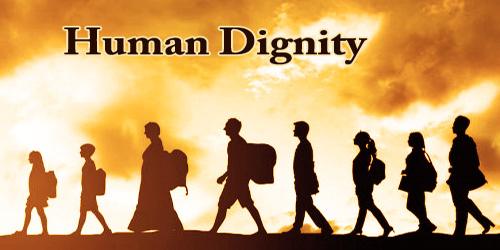In the fabric of human experience, dignity stands as a foundational thread. It constitutes a vital tenet in both theological discourse and ethical philosophy, commanding attention in discussions about human rights across the globe. Within the Christian framework, the concept of dignity transcends mere social construct, embodying a divine endowment that every individual possesses by virtue of being created in the image of God. This doctrine bears significant implications for the way we perceive human rights and the treatment of individuals in society.
At the core of the Christian belief system, the idea that all humans are fashioned imago Dei — in the image of God — serves as a justification for asserting the intrinsic value of every person. This principle undergirds numerous scriptural passages, including Genesis 1:26-27, where it is revealed that humanity was created not only uniquely but with purpose and honor. Thus, dignity becomes a divine mandate — a call for respect, fairness, and compassion that ought to permeate every social interaction, legal framework, and institutional practice.
Dignity as a human right emphasizes the inalienable rights that every individual possesses, regardless of nationality, ethnicity, or societal status. This conviction is reinforced by the Universal Declaration of Human Rights, which resonates with Christian values, asserting that “all human beings are born free and equal in dignity and rights.” In various contexts, this notion encourages societies to adopt policies and foster environments that uphold human dignity as a primary concern, challenging the systemic issues that infringe upon it.
One critical aspect of advocating for dignity is recognizing the multiplicity of contexts in which it is violated. Individuals facing marginalization due to socioeconomic factors often experience degradation of their dignity. Economic disparity can lead to the dehumanization of individuals, rendering them as mere statistics rather than valued members of society. In response, Christians are urged to embrace a theology of justice, advocating for the poor and marginalized as an extension of their commitment to uphold human dignity. This is an echo of Jesus’ ministry, which was characterized by the care for society’s outcasts, thus providing a model for contemporary stewardship of dignity.
However, dignity is not solely a matter of social justice; it also envelops the sanctity of life itself. The Christian perspective asserts that all lives are precious, and this belief has profound implications for discussions surrounding bioethical dilemmas. Issues such as euthanasia, abortion, and assisted suicide challenge the intrinsic sanctity of life by presenting arguments that often favor personal autonomy over the value of existence. Upholding dignity means advocating for life in all its forms, recognizing it as a divine gift that must be cherished and protected, drawing upon Philippians 2:3-4 as a reminder to prioritize others above oneself.
The implications of dignity extend further into the realm of interpersonal relationships. In Christian communities, practices of forgiveness and reconciliation can facilitate the restoration of dignity where it has been compromised. Forgiving not only serves to liberate the individual wronged but also reinstates the offender’s humanity, re-establishing their dignity. The act of forgiveness is powerful in reweaving the social fabric, thereby reaffirming shared humanity and commitment to a common good. By following Christ’s example, believers are called to promote an ethos of love and grace that fosters human dignity.
Moreover, the global conversation surrounding dignity as a human right garners particular importance in the face of widespread human trafficking. This heinous violation treats individuals as commodities to be exploited rather than as beings of inherent worth. Combatting this modern scourge requires a commitment from both individuals and institutions alike to champion the principles of dignity in every sphere. Awareness campaigns, advocacy, and comprehensive action plans rooted in Christian ethics can mobilize communities to work against such injustices, thereby restoring dignity to those affected.
In education, the promotion of dignity as a core value fosters environments where students are not merely recipients of knowledge but are respected as whole persons. An educational philosophy driven by a respect for each student’s dignity cultivates acceptance, nurtures self-esteem, and champions equality. Here, educators play a vital role in instilling values of empathy and respect, ensuring that students carry these principles forward into their citizenship and community engagement.
It is also imperative to reflect on the contemporary political arena. Dignity should inform public policies designed to protect the vulnerable and promote justice. Legislation aimed at eradicating discrimination, ensuring equal rights, and safeguarding the well-being of all citizens must stem from a recognition of the common dignity shared among humanity. Policymakers are implored to act in accordance with their moral and ethical convictions, promoting the welfare of all as a reflection of their belief in the sanctity of life.
Finally, the journey towards better understanding and advocating for human dignity is ongoing. Community engagement, participatory governance, and interfaith dialogue can serve as powerful platforms for collaboration. By working together, different worldviews can converge in a shared commitment to uphold human dignity, demonstrating that irrespective of religious or philosophical differences, the recognition of intrinsic worth unites us all.
In conclusion, dignity as a human right matters profoundly in every society. Through the lens of Christianity, it is imperative to advocate for and protect human dignity while resisting forces that seek to undermine it. Dignity speaks to the very core of what it means to be human, urging societies to reflect God’s image through their treatment of one another. Embracing and promoting dignity is not just a lofty ideal but a necessary pursuit that resonates deeply with the heart of Christian faith, bearing witness to hope and restoration in a world often marred by disconnection and injustice.



